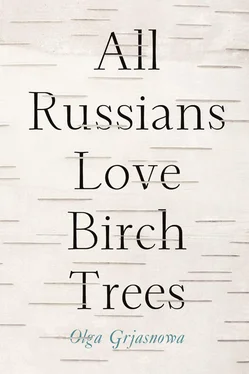We’d been together for a mere two months when we decided to travel together. We were on the road for almost four months, crossed France, into Italy, from there on to the Balearic Islands and Spain, then to Morocco, Egypt, and Turkey. During the trip Elias took pictures for his thesis show. Upon our return he disappeared into his darkroom and I started a double master’s degree: interpretation and Arabic.
The librarian wore large horn-rimmed glasses and stared at my T-shirt. I pushed the books toward him. “I’m sorry, I can’t help it. They’re beautiful. Your breasts, I mean.”
I looked him straight in the eyes — they were cold and gray. Obviously he was at ease, didn’t feel embarrassed or caught in the act, and smilingly handed me the books. Probably he had deconstructed his own sexism and now felt that he could get away with anything. I was tempted to drop the heavy stack of art monographs onto his fingers, but he withdrew his hands just in time. Then I thought about spitting at him, but that seemed a little overly theatrical.
I was so angry that I walked the entire way to the university. I hoped that would calm me down. On foot it took an hour. I had to cross the crowded downtown and financial districts. En route I was asked to donate money three times, smiled at six times, two people asked for a cigarette, three people asked me for a euro, and an aging hippie asked me to give him a tantra massage. I was too late for my seminar and my French translation was subadequate. In general, I wasn’t in the mood for Simultaneous Interpretation French — German III and Introduction à la problématique des techniques industrielles . Or any translation for that matter.
My professor asked me to come to his office hours. Over the course of my studies I had never gotten worse than a 3.7 and that was by accident in the first semester. This afternoon he would be sitting across from me, stirring his spoon around his blue mug and asking me to work harder. Then he would inquire about vineyards in Azerbaijan and would pity me for becoming multilingual so late in life. I would never be a native speaker, nothing to be done about that. And I would remain silent and stir my unsweetened tea and not mention the superb cognac from Ganja. A cognac that is available neither in an elegant bottle nor at a fancy specialty shop on Fressgass Street, but only in Ganja and only in small canisters that are mailed exclusively to real connoisseurs or close relatives. I furthermore would abstain from mentioning that I didn’t learn Azerbaijani from my parents, but from our neighbors, and that I’d spoken it fluently and without an accent until we emigrated to Germany, where I no longer had a reason to speak it in my daily life anymore. And I would leave him in the dark about the fact that in Azerbaijan, starting at age five, I had a private tutor in English and French and that my mother had to sell her mother’s diamond ring to pay for it. I wouldn’t tell him that people who live without running water aren’t necessarily uneducated. But my professor was my professor. He sponsored foster children in Africa and India. His multiculturalism took place in congress halls, convention centers, and expensive hotels. To him integration meant demanding fewer hijabs and more skin, hunting for exclusive wines and exotic travel destinations.

When I arrived at the hospital I was even angrier. Rainer said that Elias was in the middle of an examination. Heinz added, winking: “It might take a while. But don’t worry, stay with us. We’ll take care of you.” Both laughed.
I slammed my books on the table and went straight back out. There was a little park between the different wards, but it wasn’t quiet there either. The benches were constantly occupied by old people, the narrow paths congested with wheelchairs. I sat down on the only free bench and lit a cigarette. Not five minutes later a delicate old lady with a colorful hijab and golden front teeth sat down next to me. From her hospital pajamas she produced a bag of sunflower seeds, cracked them in her mouth, and spit the empty shells onto the ground directly in front of my feet.
“It’s not allowed inside anymore. The neighbors complain to the doctor.”
I replied in Russian, and her face lit up. She waved the bag of sunflower seeds in my face.
“Do you have a fiancé?”
“No.”
“A boyfriend?”
I nodded. She spit out a bunch of empty shells, satisfied.
“When I was your age I was already married.”
I shrugged.
“How often?”
“Excuse me?”
“How often?” She repeated. “How often does he hit you? Does he hit hard, with full force?”
“He doesn’t.”
“Everybody hits. My husband hit me. My mother-in-law. She, she hit the hardest. She was quite a hitter, that one. But my daughter-in-law was bad, too. I was in a hospital for two years.”
“Two years?”
“Yes. Two years.”
“Was it a locked ward?”
“Of course not, I’m perfectly clear in the head. What are you talking about? I was pregnant. With my seventh.”
I said nothing.
“As if six weren’t enough. I told him not to touch me anymore, but he kept on doing it anyway.”
I nodded.
“I didn’t want anymore. I went up on top of the closet and jumped. The abdominal organs fell out and here I was. And now I’m here again.”
I knew the man who knelt by the cash register to pick up his change. Black coat, silver hair arranged neatly around his square head. I didn’t notice him right away. Only later did I recognize his teetering gait and the pointy tips of his crocodile leather shoes. At school he passed us smilingly, the way you might pass a group of people whose faces you don’t need to discern. Windmill gave consultations and embodied the arrogance of a successful interpreter who wore the starched collar of his shirts turned up, spoke multiple languages to perfection, and got assignments from all the big institutions. Rumor had it that his voice was so agreeable over headphones that at one point he’d received a suggestive offer from a delegate of Liechtenstein. In most of his lectures he reached a state of ultimate self-reference.
Windmill stood at the register and paid for a sandwich. There was nothing but a cemetery, a funeral home, and a drugstore near the Northwest Hospital. I sat in the hospital cafeteria facing a watery soup that I couldn’t bring myself to eat. I kept imagining which bacteria were swimming among the overcooked potatoes and canned carrots. Elias had been in the orthopedic ward for two weeks and still had at least that long to go. We counted the days. The number seemed large or small depending on the mood.
Windmill gave me a smile. I cautiously smiled back. He came over and asked whether he could sit with me. All the other tables in the cafeteria were unoccupied. I nodded.
“You know what? I think we’ve met before.”
Again, I nodded.
“You were one of my students, weren’t you?” He smiled encouragingly. “Why did you drop out of my seminar?” He took a bite of his sandwich.
I remained silent.
“Russian?”
“A bit.”
I was about to elaborate, but Windmill waved dismissively and said, “I’d rather hear about your B-languages.”
“Russian, French, and English.”
“Any others?”
“Not as working languages.”
“But I’m sure you have C-options.”
I nodded and didn’t know what to say. Windmill peered at me. I nodded again and stared into my cup.
On my third day in Germany I went to school and was promptly demoted by two grades. Instead of practicing algebra I was supposed to color mandalas with crayons.
Читать дальше













